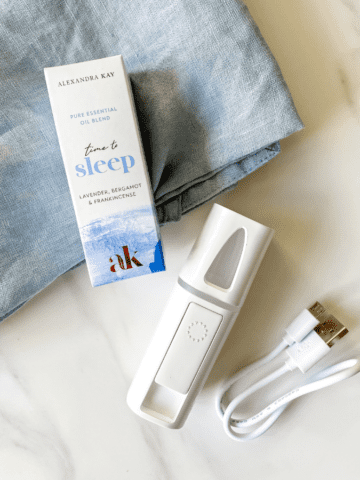Being on long-term antibiotics is, of course, not something that anyone wants to do. Yet it can also be an absolute necessity for some of us to treat difficult infections.
This is my experience of being on long-term antibiotics several times for bladder infections. It is often a difficult time, both in terms of feeling unwell in terms of physical health and from a mental health perspective too. It is hard to take a medication that people have such strong opinions of, even when it is essential for your health.

This post is simply my story and does not constitute medical advice in any way. It is for informational purposes only. I am not a doctor or health professional, and you should always follow the advice of your doctor.
Jump to:
- A diagnosis of interstitial cystitis
- Prescription: a three month course of antibiotics
- Side-effects
- It felt like a long time . . .
- Gut health and antibiotics
- And since then . . .
- Ignoring the opinions of others
- Tips for taking long-term antibiotics
- Current status on long-term antibiotics
- Related posts
- 💬 Comments
A diagnosis of interstitial cystitis
When you live with multiple chronic illness conditions it can be easy to overlook a symptom (or two, or three even), in my experience at least. The most difficult get all my attention but the less pesky ones get shoved to the back of my mind, with the thought that I should deal with it. But just not today. When things are better. And I have time. And patience . . .
It was this way with bladder symptoms.
I knew that I was getting pain, a deep lower abdomen pain that was likely my bladder. And I knew that I seemed to need to go to the bathroom rather frequently.
But I shoved it to the back of my mind as I was in the midst of dealing with PoTS, vestibular migraine and a few other diagnosed conditions that were tough enough. Then my cardiologist asked about my bladder and I went along with the referral to a uro-gynaecologist.
Things moved quite fast, and I was soon having a cystoscopy which showed inflammation and infection, as well as other tests.
Prescription: a three month course of antibiotics
My cystoscopy results led to being prescribed a three month course of antibiotics, cycling between three different types for two weeks each and then repeating it.
I was aghast at this treatment plan to begin with. After all, we are told that we should reduce the number of antibiotics we should take and there are implications for our gut health too.
Yet it was also the case that the infection needed to be dealt with, not least of which because it was potentially driving, or at least complicating, my mast cell activation syndrome.
I took the first tablet with great reluctance. The thought of 90 days of antibiotics seemed like a huge mountain to climb, and I was anxious about side-effects.
Side-effects
My first question to the doctor had been the same as I suspect it is for many of us: what are the side-effects? I was told potential nausea, upset stomach and headache, amongst others.
The first antibiotic I took was a breeze. It was the strongest, but I was fine. In fact my IBS stomach was as happy as larry on them. I had less IBS issues and was almost happy to be taking them.
Then I hit a stumbling block. Antibiotic number two made me nauseous. Really nauseous. On day three I was barely able to move off the sofa, and on day four I was sick. A call to the doctor meant a change in the antibiotic, which worked out fine.

It felt like a long time . . .
Ninety days is a long time, but I know many in the chronic illness community take antibiotics for far longer. It can be years sometimes, to try and get on top of embedded infections for various medical conditions. In comparison 90 days is just a drop in the ocean.
For me, it felt like a long time, mostly because I was worried about gut health but also because of having to time taking the tablets around food. Some you took an hour before, others an hour after. It was all very confusing.
Key tip: use the alarm on your phone to remind you to take the pill!
Gut health and antibiotics
It is of course the case that gut health can suffer as a result of long-term antibiotics.
I was fortunate to see a dietician around the time I was taking this long-term course of antibiotics. She suggested two things:
- Eat a large variety of plant foods
- Take probiotics after finishing the course of antibiotics
I did both, and actually followed the suggestion by Dr Megan Rossi on eating 30 different plant foods in a week. Her book The Gut Health Doctor: An Easy to Digest Guide to Health from the Inside Out is very insightful.
Personally, I think both helped but it should be noted that the use of probiotics in this way is debated and some studies show it delays gut health recovery (BBC Future).
And since then . . .
Since that long-term course of antibiotics I have had to do the same regime again once, and taken antibiotics at other times for shorter periods too.
One year I calculated I had been on antibiotics for more days than not. It isn't a nice feeling, and brings worry about overall health, but I knew that it was absolutely necessary for me.
Aside from bladder issues and recurrent infections (UTIs), I also managed to get infected bug bites several times and a skin infection too.
It was a worrying time, and I am sure that being on antibiotics was making me more tired, giving me more headache / migraine days and was problematic for my gut.
Ignoring the opinions of others
One thing that did upset me during my time on long-term antibiotics was being told over and over by people that I shouldn't be taking them. I mentioned it on my Instagram and had DMs from people I didn't know (they didn't follow me, or vice-versa) and who didn't know WHY I was taking them that I was being stupid and it was bad for my health.
Those kinds of comments are always hurtful and make me a bit angry too. It is upsetting to be criticised for trying to manage health conditions, and any form of pill-shaming can make a person feel (wrongly) guilty or 'less than' for taking prescribed medication.
I knew my doctors were being incredibly careful about my antibiotic use and were prescribing them because there was no other choice. It wasn't done without thought and care.
I had to take a deep breath and realise one thing: at that point it was the best thing for my health to be on the antibiotics. I had infections that were causing harm and there was no other option to treat them.
Tips for taking long-term antibiotics
From my experience, taking long-term antibiotics can be difficult to manage both in terms of physical and mental health. Some suggestions for this process:
- Sometimes it is necessary for your health, and you shouldn't feel guilty or bad about it.
- Work with a doctor you trust, and ensure that they are being careful about your prescription.
- Get a second opinion if you are unsure about the doctor or treatment plan.
- Ask about side-effects and see if there are measures that can help manage them. For example, I found the Blisslets nausea relief bands to be very helpful for feeling nauseous, alongside drinking fresh ginger tea.
- Liaise with your doctor about side-effects. It may be that you need to alter a dose, or switch to another type.
- Seeing a dietician may be useful to discuss ways to support your gut health.
- Understand that it is not anybody else's business but yours and your doctor as to the medications you are taking.
- Look to the future and how they will support your health journey.
Blisslets has kindly given my readers 15% off with the code fibrofog
Current status on long-term antibiotics
Right now I am on a very low dose antibiotic that is very specific to my bladder (in the words of my doctor). It is necessary and has been so beneficial. I haven't had a UTI for months, which is a very different story to a few years ago when they were coming at me constantly.
I'm also just finishing up another week-long course for an infected bug bite that had me in the hospital at 11pm on a Saturday night. It's been a rather full-on time in terms of medications!
For the time being I will stay on this low dose antibiotic as a prophylactic measure until I am able to have a further cystoscopy and investigations, which are currently on hold. I've tried a few times to reduce from two tablets a day to one, but each time I get increased pain. All this tells me is that I need this medication right now and it is the best option, for me personally.
Related posts
Interview with Zoe on IC, exercise and suprapubic catheters
If you would like to follow along for more posts on living with chronic illness, then come join me on Instagram and Twitter!

















lyn says
I have had 24 UTI this year also 24 lots anti biotics some have had horrible side effects as I also have copd and some affected my breathing ,I was so relieved to hear of someone else having the same problems and sick of people saying I shouldn't be on them this long and be taking so many but what can you do ?
Claire says
Hi Lyn, I would suggest to see a doctor that specialises in chronic UTI as they may be able to offer you treatment that is helpful. So sorry you are having to go through this.